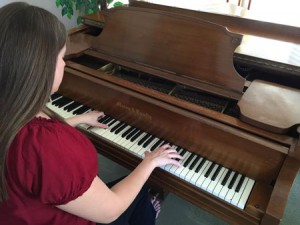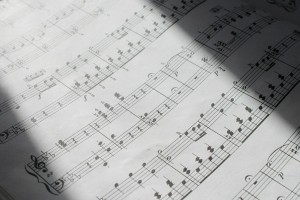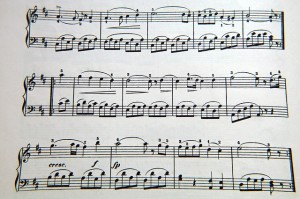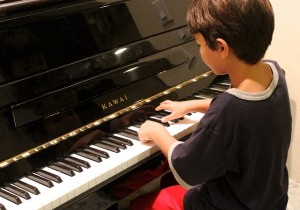 Why Memorize?
Why Memorize?
Many of my students are preparing for our upcoming piano recital, in which I require a certain level of memorization. Memorization is incredibly important when you’re performing because it demonstrates that you know the music inside and out. Performing music is far more than playing the notes — it is an art where you must put emotion, feeling, and thought into your music. If you do not know the notes in your mind, and if your fingers do not know how to play them, your performance energy will go to that first, and then there will be little energy left for the artistry.
Professional pianists often have to memorize hours and hours’ worth of music at a time. Every competition I performed in as a youth required that I memorize all my music, and the same was required for every audition and most of my performances. The only time I could use the sheet music was when I was playing as part of the orchestra or band. As a professional musician, I continue to memorize the music most times that I perform. With music committed to memory, it becomes a part of you, something that you can pull out of yourself with all that you have to give. Your performance of a memorized piece is a performance of a piece of music that has become a part of you.
Here are 16 suggestions for how to memorize music so that you can be ready to perform it without the sheet music in front of you. While this post is written for pianists, any musician will find these suggestions useful in memorizing music for their instrument or voice.
 1. Start Small
1. Start Small
Do not bite off more than you can chew by selecting a Beethoven Sonata for your first memorized performance piece. Choose something short, something that will still challenge you a bit but is more manageable. Here is where you should trust your teacher, as a good teacher will be able to guide you toward what he or she thinks you are ready to memorize. Start small so that you can set yourself up for success and also get to feel a sense of accomplishment. Next time, try something a little more difficult.
2. Give Yourself Time
With few exceptions, memorization takes time. Give yourself time to memorize your piece. As you memorize more and more, you will get faster at it. Don’t put it off until a week before the performance; work at it from the beginning so that you can really get it ingrained in your head and in your fingers.
3. Practice Your Music Daily
There’s nothing more important to memorization than repetition. If you practice a piece of music for 30 minutes and then don’t return to it for one week, it’s almost like relearning it all over again. Playing it daily keeps it fresh in your mind and solidifies it in your memory. Anyone who has ever studied for an exam knows that the best way to retain information is to review it regularly, quiz yourself, test yourself, etc. to make sure that you can recall it when you need to. Repetition is crucial.
4. Learn the Correct Fingering
This is by far the most difficult thing for many amateur pianists to master. You may think that the fingering is not important, that what matters is that you hit the right notes. Even ignoring the multitude of other reasons why correct fingering is important, correct fingering is essential to memorization because it is your fingers’ way of memorizing the music. Your mind may memorize the music, but if you do not take the time to teach your fingers to play it a certain way, your fingers have to relearn the way to play the music every time you go to your instrument. If you fail to learn the correct fingering, you are forcing your fingers to do extra work and are making everything harder for yourself. Spend the time teaching your fingers the correct fingering, and muscle memory will become your friend as your fingers will remember how to play it the same way every time. That way, if your mind suddenly freezes and you forget what’s next, your fingers will know what to do and can help you out.
5. Listen to Recordings of Your Music
Find an exact recording of your music and listen to it frequently. Listen to the notes and become very familiar with what leads into what, how each passage builds to the next. If you do not have a clear direction of where your piece is going at every moment in the music, you will never memorize it. If you know the piece well because you’ve heard it many times, you will have it half memorized already. It is also helpful to follow along with your sheet music while listening to the recording. **Important note: Be sure you are listening to the correct recording of your music, as many performers take small liberties with the notes and expressions. You will want to learn it correctly and not to just mimic another performer.
6. Listen While You Play
If you aren’t listening to how the music sounds as you play, you will never memorize it. You have to learn to listen to yourself. You will only be able to do this if you practice your music enough so that the notes/fingerings/etc come more naturally and require less concentration to play. Once you are there, listen to yourself to become more and more familiar with what your music sounds like. This will also prepare you for how to put more emotion and depth into your performance, because you will be used to listening to how you sound.
7. Look For Patterns
Patterns are your friend. Patterns are easier to memorize. Music is not just a jumble of notes; it is a set of phrases that all go together. Most pieces of music have substantial amounts of repetition. Line A may lead to Line B, then Line A repeats and leads to Line C. Your left hand may play a repeated octave jump of 5-1-5-1-5-1-5-1, which is easier to memorize and allows you to focus on what your right hand is doing. Look for repeated melodic lines. Look for repeated chord progressions. Look for the patterns in your music. Any repeated pattern, you just have to memorize once! Then all it takes is putting the pieces together in the right order.
 8. Make It Relatable
8. Make It Relatable
If there is one section that you struggle to remember, find a way to make it relatable. See if you can figure out how it reminds you of another piece of music that you are familiar with. As an example, if you struggle with remembering the correct notes in a descending scale, think of the first line to the Christmas song, “Joy to the World” — this line is a descending scale, so if your descending scale sounds like Joy to the World, you will know you are playing it correctly. You could even put words to the music to help you remember how it goes, or create a mnemonic device that will help you remember the order of chords in the left hand chord progression. Make your music relatable to things that you know or things that are easier to memorize, and you will find that it is easier to memorize your music.
9. Do Not Practice It Incorrectly
This may seem obvious, but all too often piano students mess up repeatedly and then never go back to correct themselves. While this may be fine to do on the occasional flub, if you never correct your mistakes, you will never learn to play the music correctly. Often, there are several sections that you always mess up. These are the sections that you should stop and go back to practice again until you can play the music without messing up. This will help you memorize them and will help prevent you from messing up in those same sections once you have memorized your music.
10. Look At Your Hands
When you aren’t looking at your sheet music, where are you looking? In most cases, you will be looking at your hands. Before you completely take away your sheet music, allow yourself to become familiar with the way your hands look while playing your piece. Your eyes will get used to looking and identifying where your hands will go. When you have your piece memorized and you are looking at your hands as you play, your eyes will help guide you to the right notes.
11. Take It a Little at a Time
Don’t try to memorize the whole piece all at once. Begin with one measure, one line, one phrase. Choose the smallest segment and work with that. Then, little by little, add to it. Do not try to do too much in one practice session. One focused practice session may lead you to memorize two measures, one line, two lines, or even a full page if you are naturally good at memorizing. The point is, don’t overload yourself. Take it a step at a time, then leave it and come back the next day. Review what you worked on the previous day, and if it’s still solid in your memory, then build on it. If not, go back and review.
12. Memorize One Aspect of the Music at a Time
Following the suggestion above, memorize the notes with the correct fingering first, as that is the toughest and most important part. Once you have those memorized, add in the dynamics, or the articulations, or the phrasing. Memorize one aspect at a time, one layer at a time, and before long you will be able to piece it all together.
13. Play With Your Eyes Closed
Or turn out the lights. Whichever one you prefer. If you can play the music even fairly well without being able to see the keys or your fingers, pat yourself on the back. This is a great way of testing your memorization. Go as far as you can until you simply can’t go on, then go back and continue working on it. Eventually, your goal will be to play through the whole piece.
14. Rehearse It Away From the Piano
Testing your memory is not just something to do at the keys. Rehearse your music mentally. Sing through it in your head. “Play it” with your fingers on the table or desk. Rehearse it away from the piano any time you can to keep it fresh in your mind.
15. Review Immediately Before Your Performance
Before you perform your memorized piece, you should review the whole thing. Rehearse it at the piano, rehearse it mentally on your way to the performance, and look through the sheet music to remind yourself of how it all goes together. This will solidify in your mind that you know this piece backwards and forwards.
16. Don’t Get Frustrated!
Most importantly, don’t let yourself get frustrated! Memorizing music can be hard, and not everyone will memorize at the same pace. It may take you longer than you’d like, but this is no time to get frustrated. Music is meant to be a part of you, which is a large part of why you’re learning it. Music is fun to play, and it is wonderful to listen to. Music touches the soul and becomes part of us when we listen to it and play it. How much more a part of you could it be if you memorized it? Go ahead and push yourself, but don’t let yourself get frustrated. Frustration will only prevent you from succeeding. Let it happen at its own pace, and you will feel like a million bucks when you reach your memorization goals.
 If you follow these suggestions, you will be able to memorize your sheet music so that you can perform it with complete confidence at a moment’s notice. I wish you all the best! You can do this! Happy memorizing =)
If you follow these suggestions, you will be able to memorize your sheet music so that you can perform it with complete confidence at a moment’s notice. I wish you all the best! You can do this! Happy memorizing =)

